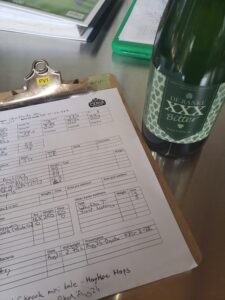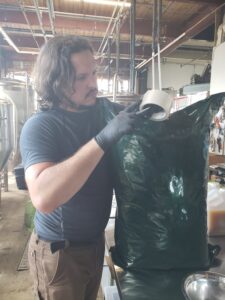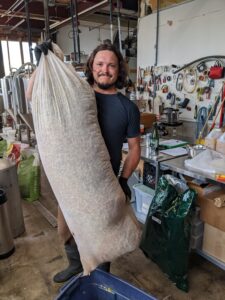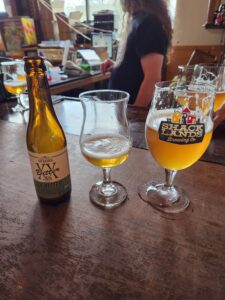I was talking to Kalev Nisbet and Dave Watts the other month at Shacklands, probably over a pint of Special Belgian Ale when the subject of De Ranke came up. Neither of them had ever had De Ranke XX Bitter or De Ranke XXX Bitter, for that matter. For a Belgian inspired brewery, this seemed to be a glaring omission in experience.
It’s for this reason that I found myself at Premier Gourmet in Buffalo with what can only be described as an excessive amount of beer in my cart. While Premier Gourmet is a marvelous shopping experience which seems only to have improved with time, it is an open threat to your wallet. I retrieved both of the De Ranke beers, neither of which in particularly good nick from the perspective of freshness, and brought them back to Toronto.
When you want to show something like that off, you worry about the number of miles on the bottle and the condition it might be in. It turns out that I needn’t have worried. Despite the small amount of skunk the green bottle allowed for, most of the hop aromatics were intact if muted. The bitterness was still present.
De Ranke XX Bitter is something I enjoyed for the first time at Cafe Le Coq in Brussels, a legend in the “old man” genre of bar, with Eoghan Walsh who kindly showed me around the city’s downtown core and got only a hangover and some kind words for his efforts. He’s a lovely man and good writer, and I can only apologize for the state he was in the next day.
The beer is six percent alcohol, and fully sixty bitterness units. At the time of its genesis, that was extremely high. Belgian brewers didn’t really do bitterness and Nino Bacelle was an outlier to tradition. The beer is also made with locally harvested whole cone Hallertau Mittelfruh hops, so it’s not as though you’re just getting bitterness. There’s the vegetal tannin and slight spice that comes with the bracts of those beautiful yellow flowers.
Based on what I understand, De Ranke XX Bitter is the delineation point, canonically speaking, between the old school and the new. For those in Ontario, it’s similar to Great Lakes Devil’s Pale Ale; it freed people up to think in a new way.
So, there we are, tasting the beers some time in early August and in a fit of delusional optimistic pique we thought, “well, we could do that.” I had very much hoped that would be the outcome.
The important thing in creating an homage to De Ranke XX is that you need to use fresh whole cone hops. The idea that they should be local is important, and we were lucky to get ten pounds of Chinook whole cone from Scott Hayhoe at Hayhoe Hops before everything went to the pelletizer. I’ve used Scott’s hops before and I’ve got to say they’ve never disappointed.
We’re billing it as a Fresh Hopped Belgian Golden Ale. We tried it yesterday against the De Ranke XX and I’m pleased to say that we failed to recreate that beer. We made something that stands on its own two feet with beautiful if subtle wildflower notes that really let you know that Chinook is present. The attenuation of the house yeast strain combines with structural hop tannin in concert to create a pleasing, drying sensation on the finish despite the fact that it starts out quite full bodied. I’m very happy with it. In discussing it, we think we’d bump the bitterness next time, possibly after seeing if De Ranke will give us some feedback.
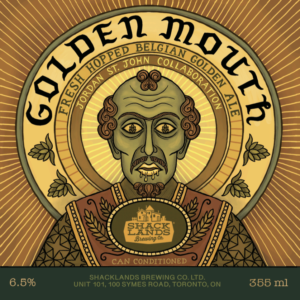
If you’re naming a Golden Ale, why not play with the Monastic and secular traditions that Belgian brewers get to enjoy? Naming beer after a saint is a time-honored gimmick and if your last name is St. John, you’ve got a number to choose from. We went with John Chrysostom, literally translating to “Golden Mouth.” He is mostly famous for his extremely direct oratory, to wit:
What good is it if the Eucharistic table is overloaded with golden chalices when your brother is dying of hunger? Start by satisfying his hunger and then with what is left you may adorn the altar as well.
It pleases me to say that part of the proceeds for Golden Mouth will go to Unity Kitchen at The Church of the Holy Trinity Toronto. It’s tucked in behind the Eaton Centre. The original rector was Henry Scadding, who was also just about the city’s first historian. We went to the same school, and I’m something of a historian myself. Unity Kitchen hosts a program that issues lunches and survival supplies to people who need them. They work with a large number of groups within the city and seem to me to be the most direct way to help people who really need some help. We’re going into a recession during a pandemic and food insecurity and homelessness, already significant issues in Toronto, are going to be magnified.
I hope you like the beer. I hope you look at Unity Kitchen and consider making a donation. Sometimes with charitable giving, you’re not quite sure what your money is going to accomplish. With Unity Kitchen, you know exactly what it’s going to do: feed and clothe people.
